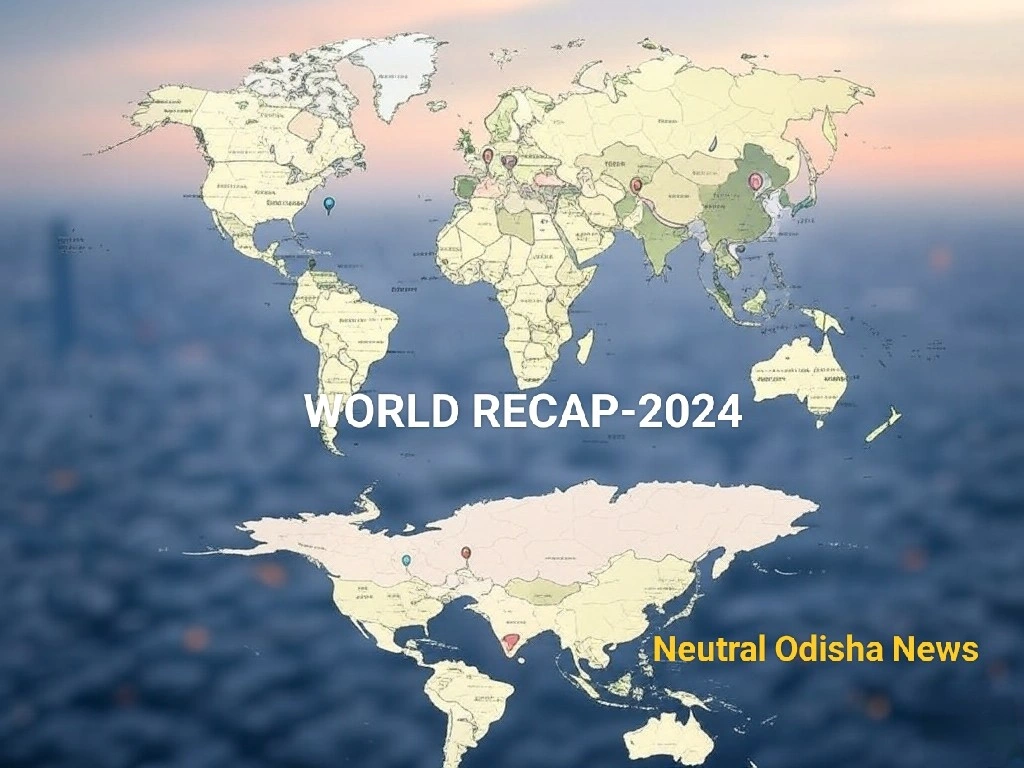The year 2024 has been marked by significant events across various domains, including politics, society, economy, environment, science, technology, and more. Below is a comprehensive overview of these developments:
Political Events
• United States Presidential Election: In a historic political comeback, Donald Trump won the U.S. presidential election, defeating incumbent President Kamala Harris. This victory has significant implications for both domestic and international politics.
• Global Elections: Over 70 countries held elections, serving as a stress test for democratic systems worldwide. Notably, Mexico elected its first female president, Claudia Sheinbaum, amid significant violence. In South Africa, the African National Congress (ANC) faced its worst result since the end of apartheid, signaling a shift in the nation’s political landscape.
• Leadership Changes: Significant leadership transitions occurred, including the inauguration of a new Prime Minister in Singapore after Lee Hsien Loong stepped down following 20 years in charge. Additionally, Slovak Prime Minister Robert Fico was tragically assassinated, leading to political upheaval in the region.
Social and Legal Developments
• Democratic Resilience: Despite challenges, democracy demonstrated resilience. Orderly power transfers occurred in several countries, even amid unrest, highlighting the strength of democratic institutions.
• Legal Proceedings in the U.S.: Former President Donald Trump was found guilty in a historic New York hush money case, raising questions about the legal and ethical standards of public officials.
Economic and Trade Developments
• Global Economic Outlook: As the world emerged from the COVID-19 pandemic, new challenges surfaced. Central banks lowered interest rates, and stock markets reached new highs. However, a cost-of-living crisis led to voter disillusionment and political changes in several major countries. Potential U.S. import tariffs under President Trump’s administration could incite trade wars, raising inflation and unemployment.
• Geopolitical Risks: Unresolved conflicts and competitions, particularly between the U.S. and China, continued to pose significant geopolitical risks, affecting global trade and economic stability.
Environmental and Climate Events
• Climate Change Impact: Climate change intensified, leading to severe weather events. In Spain, record-breaking temperatures resulted in over 8,000 heat-related deaths and a severe drought that drastically reduced olive oil production. Wildfires and unprecedented floods further exacerbated the situation, leading to political unrest and protests against government inaction.
• Natural Disasters: A significant landslide in Papua New Guinea resulted in a death toll climbing to 2,000, highlighting the devastating impact of natural disasters exacerbated by environmental changes.
Scientific and Technological Advances
• Artificial Intelligence (AI): AI emerged as a central issue motivating geopolitical competition and regulatory dynamics. Nations grappled with the implications of AI on security, economy, and society, leading to increased investments and policy discussions.
• Space Exploration: Significant milestones were achieved in space exploration, with various countries launching missions to the Moon and Mars, advancing our understanding of the cosmos and showcasing technological prowess.
Health and Medicine
• Pandemic Recovery: The global community continued its recovery from the COVID-19 pandemic. Vaccination efforts and healthcare improvements were prioritized, though disparities remained between different regions.
• Medical Breakthroughs: Advancements in gene therapy and personalized medicine offered new hope for treating previously incurable diseases, marking a significant leap in medical science.
Cultural and Social Movements
• Entertainment: The entertainment industry saw a resurgence with the return of major film festivals and concerts, adapting to new norms and technologies post-pandemic.
• Sports: Global sporting events, including the Summer Olympics, were held successfully, bringing nations together and highlighting the unifying power of sports.
• Religious Events: Significant religious gatherings resumed, with millions participating in events like the Hajj pilgrimage, reflecting a return to pre-pandemic religious practices.
Tourism
• Travel Industry Rebound: The tourism sector experienced a robust rebound as travel restrictions eased, with a surge in international travel boosting economies dependent on tourism.
Geopolitical Conflicts and Defense
• Ongoing Conflicts: Conflicts persisted in regions like Ukraine, the Middle East, and parts of Africa, contributing to global instability and humanitarian crises.
• Defense Strategies: Nations reevaluated their defense strategies in response to emerging threats, leading to increased military spending and alliances.
Environmental Policies
• Climate Policies and Elections: Elections around the world had significant implications for climate policies. The outcomes influenced national commitments to environmental agreements and the implementation of sustainable practices.
Discovery
• Archaeological Finds:
• In Egypt, a hidden corridor in the Great Pyramid of Giza was unveiled using cosmic-ray imaging, revealing new insights into its construction.
• A prehistoric cave painting dating back 40,000 years was discovered in Indonesia, changing theories about early human art.
• Scientific Discoveries:
• The identification of a previously unknown deep-sea species in the Mariana Trench showcased the fragile biodiversity of underwater ecosystems.
• Astronomers discovered an Earth-like exoplanet in the habitable zone of a nearby star, raising hopes of extraterrestrial life.
Space
• Mars Exploration:
• NASA’s Perseverance rover achieved new milestones by producing oxygen directly from the Martian atmosphere using MOXIE (Mars Oxygen In-Situ Resource Utilization Experiment).
• India’s Chandrayaan-4 mission mapped subsurface water reservoirs on the Moon, enhancing future lunar exploration plans.
• Space Tourism:
• Companies like SpaceX and Blue Origin conducted commercial flights to the Kármán line, making space tourism a reality for wealthy civilians.
• Space Defense:
• The U.S. and allied countries collaborated on the Space Security Alliance to counter potential space-based threats.
Technology and AI
• Generative AI Dominance:
• AI systems like GPT-5 revolutionized industries with advanced language understanding, significantly impacting customer service, education, and entertainment.
• AI-driven innovations led to breakthroughs in renewable energy grid management, reducing energy wastage globally.
• Quantum Computing Breakthroughs:
• IBM and Google achieved quantum supremacy with devices capable of solving problems that classical computers could not.
• Autonomous Systems:
• Advances in self-driving technology saw major companies like Tesla launch fully autonomous vehicles in select cities.
Medicine
• Gene Therapy Advancements:
• A new therapy successfully treated sickle cell anemia, providing hope for millions suffering from genetic disorders.
• Researchers made strides in using CRISPR technology to cure inherited blindness.
• Universal Flu Vaccine:
• Clinical trials for a universal flu vaccine showed promising results, potentially reducing seasonal flu outbreaks.
• Pandemic Preparedness:
• A global agreement at the World Health Assembly laid the groundwork for rapid vaccine development for future pandemics.
Entertainment
• Streaming Dominance:
• The rise of AI-generated content in platforms like Netflix and YouTube transformed the production process, creating hyper-personalized shows.
• The global success of virtual concerts featuring AI-generated avatars demonstrated a paradigm shift in the music industry.
• Cinema Milestones:
• Films like “Oppenheimer 2” and “Avatar 3” broke global box office records, solidifying Hollywood’s comeback post-pandemic.
Sports
• Olympics 2024:
• Paris hosted the Summer Olympics, emphasizing sustainability with venues powered by renewable energy.
• Athletes from emerging nations like Uganda and Fiji won gold, signaling broader inclusivity in global sports.
• Football:
• Lionel Messi retired from international football after leading Argentina to another Copa América title.
• Cricket:
• The T20 World Cup in the West Indies and the U.S. showcased cricket’s expanding global appeal.
Religion
• Global Religious Gatherings:
• The Kumbh Mela in India attracted millions, becoming a showcase of religious devotion and massive logistics planning.
• The Pope’s World Youth Day speech in Lisbon inspired young Catholics worldwide.
• Interfaith Dialogues:
• In response to rising global conflicts, the United Nations held a global interfaith summit, promoting peace among diverse religions.
Tourism
• Post-Pandemic Boom:
• Japan, Italy, and the Maldives topped the list of most-visited destinations as global tourism rebounded strongly.
• Initiatives like eco-tourism in the Amazon gained traction, focusing on sustainable travel.
• Virtual Tourism:
• Immersive virtual reality platforms offered tourists the experience of iconic locations like the Eiffel Tower and the Great Wall of China without leaving home.
• Heritage Preservation:
• UNESCO funded restoration projects for World Heritage sites like Notre Dame and Machu Picchu, driving cultural tourism.
SpaceX Achievements in 2024
Elon Musk’s SpaceX achieved significant milestones in 2024, solidifying its position as a leader in space exploration and technology:
1. Starship Milestones:
• SpaceX’s Starship successfully completed multiple launches, becoming the first fully reusable spacecraft to transport both cargo and astronauts.
• The spacecraft played a critical role in NASA’s Artemis III mission, delivering materials for constructing the Moon’s first sustainable base.
2. Mars Preparations:
• SpaceX accelerated its plans for Mars colonization, with successful tests of long-duration life support systems aboard Starship.
• The company announced its first cargo mission to Mars, scheduled for 2026, to deliver essential supplies for future human settlement.
3. Satellite Deployment:
• The Starlink project reached a new high, with over 5,000 satellites deployed, providing high-speed internet access to remote regions worldwide.
• SpaceX introduced Starlink Premium, offering enhanced internet speeds tailored for businesses and governments.
4. World’s First Commercial Space Station:
• In collaboration with Axiom Space, SpaceX launched the first module of a private, commercial space station, paving the way for the privatization of orbital facilities.
5. Space Tourism Expansion:
• SpaceX conducted multiple space tourism missions, including a historic orbital flight with a crew entirely composed of private citizens, including individuals from developing nations through sponsorship programs.
6. Space Defense Initiatives:
• SpaceX partnered with global defense agencies to develop satellite-based missile detection systems, enhancing security infrastructure.
7. Environmental Sustainability in Space:
• SpaceX led efforts in space debris cleanup, deploying advanced robotic systems to collect and deorbit old satellites, showcasing its commitment to sustainable space operations.
8. Global Collaboration:
• Collaborations with space agencies like ESA, ISRO, and JAXA enabled joint missions that shared resources and expertise, fostering international cooperation.
SpaceX’s achievements in 2024 demonstrated a transformative impact on space exploration, bridging the gap between science fiction and reality. These milestones marked a pivotal year in humanity’s quest to explore and utilize space.
The events of 2024 underscore a year of significant transformation and challenges across multiple sectors. From political upheavals and economic uncertainties to environmental crises and technological advancements, the global community faced a complex landscape requiring resilience, adaptability, and collaborative efforts to navigate.



